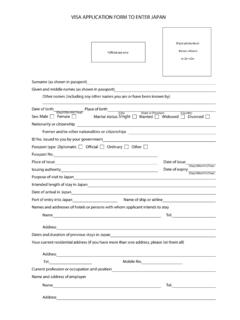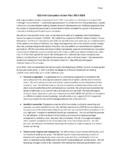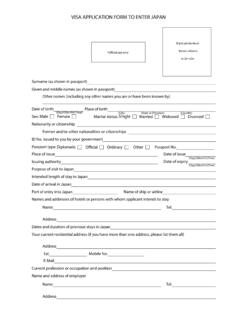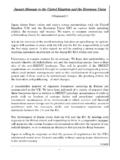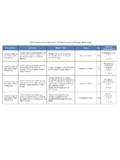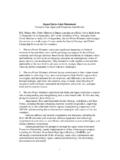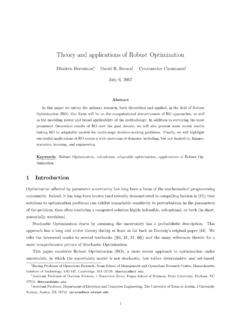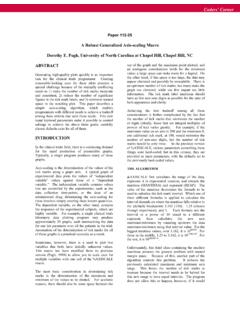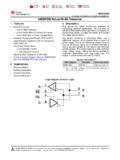Transcription of JOINT STATEMENT OF THE SECURITY …
1 1 JOINT STATEMENT OF THE SECURITY CONSULTATIVE COMMITTEE Toward a More robust Alliance and Greater Shared Responsibilities October 3, 2013 By Minister for Foreign Affairs Kishida Minister of Defense Onodera Secretary of State Kerry Secretary of Defense Hagel I. Overview On October 3, 2013, the SECURITY Consultative Committee (SCC) convened in Tokyo, with the participation of both the Secretaries of State and Defense and Japan s Ministers for Foreign Affairs and of Defense. On the occasion of this historic meeting, the SCC reaffirmed the indispensable role our two countries play in the maintenance of international peace and SECURITY and reconfirmed our Alliance s commitment to the SECURITY of Japan through the full range of military capabilities, including nuclear and conventional.
2 The two sides also set forth a strategic vision that, reflecting our shared values of democracy, the rule of law, free and open markets, and respect for human rights, will effectively promote peace, SECURITY , stability, and economic prosperity in the Asia-Pacific region. At the SCC meeting, the Ministers exchanged views on the evolving SECURITY environment in the Asia-Pacific region and decided upon several steps to upgrade significantly the capability of the Alliance. Our strategic vision for a more robust Alliance and greater shared responsibilities is to be based on revising the 1997 Guidelines for Defense Cooperation, expanding SECURITY and defense cooperation in the Asia-Pacific region and beyond, and approving new measures that support the realignment of forces in Japan.
3 The United States also welcomed Japan s determination to contribute more proactively to regional and global peace and SECURITY . The Ministers stressed the importance of multilateral cooperation with regional and international partners. As the United States continues to implement its rebalance to the Asia-Pacific region it intends to strengthen military capabilities that allow our Alliance to respond to future global and regional SECURITY challenges, including in emerging strategic domains such as space and cyberspace. The Ministers stressed that the realignment of forces in Japan is to ensure that the presence maintains deterrence and provides for the capabilities to defend Japan and respond to regional contingencies, while remaining politically sustainable. In this context, the Ministers reiterated the ongoing mutual commitment to complete the agreements on the realignment of forces in Japan, including 2 constructing the Futenma Replacement Facility (FRF) and relocating Marines to Guam, and welcomed the progress made in that regard.
4 Japan s SECURITY policy continues to reflect its long-standing commitment to regional and global peace and stability, as well as its intention to make more proactive contributions to addressing the challenges faced by the international community. At the same time, Japan will continue coordinating closely with the United States to expand its role within the framework of the Alliance. Japan is also preparing to establish its National SECURITY Council and to issue its National SECURITY Strategy. In addition, it is re-examining the legal basis for its SECURITY including the matter of exercising its right of collective self-defense, expanding its defense budget, reviewing its National Defense Program Guidelines, strengthening its capability to defend its sovereign territory, and broadening regional contributions, including capacity-building efforts vis- -vis Southeast Asian countries.
5 The United States welcomed these efforts and reiterated its commitment to collaborate closely with Japan. To accomplish our shared strategic vision for the Alliance against the backdrop of a complex regional SECURITY environment, the Ministers recognized that the Alliance is the cornerstone of peace and SECURITY in the region. Over the next decade, the Alliance intends to continue to address SECURITY challenges through close cooperation and a more interoperable and flexible force posture that enables side-by-side and agile contingency response and crisis management. The Ministers affirmed that the Alliance should remain well positioned to deal with a range of persistent and emerging threats to peace and SECURITY , as well as challenges to international norms. Among these are: North Korea s nuclear and missile programs and humanitarian concerns; coercive and destabilizing behaviors in the maritime domain; disruptive activities in space and cyberspace; proliferation of weapons of mass destruction (WMD); and man-made and natural disasters.
6 As stated in the 2011 SCC JOINT STATEMENT , the Ministers continue to encourage China to play a responsible and constructive role in regional stability and prosperity, to adhere to international norms of behavior, as well as to improve openness and transparency in its military modernization with its rapid expanding military investments. The United States and Japan resolve to be full partners in a more balanced and effective Alliance in which our two countries can jointly and ably rise to meet the regional and global challenges of the 21st century, by investing in cutting-edge capabilities, improving interoperability, modernizing force structure, and adapting Alliance roles and missions to meet contemporary and future SECURITY realities. To this end, our Alliance should emphasize improved cooperation and coordination, including on information SECURITY , equipment and technology, cyber SECURITY , and space SECURITY , in order to broaden and deepen cooperation across a wide range of Alliance issues.
7 3 II. Bilateral SECURITY and Defense Cooperation The Ministers pledged to continue deepening the Alliance and directed work on a robust agenda to ensure the Alliance s credibility into the future. Among the tasks before us are revising the Guidelines for Defense Cooperation, expanding our ballistic missile defense capabilities, improving cooperation on emerging strategic domains such as space and cyberspace, as well as strengthening information SECURITY and equipment acquisition collaboration, in order to broaden cooperation across a wide range of Alliance issues. Guidelines for Defense Cooperation Recognizing the implications of the evolving regional and global SECURITY environment, the Ministers directed the Subcommittee for Defense Cooperation (SDC) to draft recommended changes to the 1997 Guidelines for Defense Cooperation, to ensure that the Alliance continues its vital role in deterring conflict and advancing peace and SECURITY .
8 The Ministers identified several objectives for this revision, including: o ensuring the Alliance's capacity to respond to an armed attack against Japan, as a core aspect of defense cooperation; o expanding the scope of cooperation, to reflect the global nature of the Alliance, encompassing such areas as counter-terrorism, counter-piracy, peacekeeping, capacity building, humanitarian assistance/disaster relief, and equipment and technology enhancement; o promoting deeper SECURITY cooperation with other regional partners to advance shared objectives and values; o enhancing Alliance mechanisms for consultation and coordination to make them more flexible, timely, and responsive and to enable seamless bilateral cooperation in all situations; o describing appropriate role-sharing of bilateral defense cooperation based on the enhancement of mutual capabilities; o evaluating the concepts that guide bilateral defense cooperation in contingencies to ensure effective, efficient, and seamless Alliance response in a dynamic SECURITY environment that includes challenges in emerging strategic domains such as space and cyberspace; and o exploring additional ways in which we can strengthen the Alliance in the future to meet shared objectives.
9 The Ministers directed that this task for the SDC be completed before the end of 2014. BMD Cooperation The Ministers confirmed their commitment to enhance the ballistic missile defense (BMD) capabilities of both countries and welcomed recent progress in this area, including the SM-3 Block IIA cooperative development program. They confirmed 4 their intention to designate the Air Self-Defense Force base at Kyogamisaki as the deployment site for a second AN/TPY-2 radar (X-band radar) system, consistent with the May 1, 2006, SCC Document: United States-Japan Roadmap for Realignment Implementation. The SCC members also affirmed the continuing goal of expanding bilateral cooperation in this area. Cooperation in Cyberspace The first Cyber Dialogue, held in May 2013, affirmed that the United States and Japan share common objectives in international cyber fora, especially the application of norms of responsible State behavior in cyberspace.
10 The Ministers stressed the need for close coordination with the private sector in addressing challenges to the safe and secure use of cyberspace. In particular, the Ministers recognized the need to promote a whole-of-government approach to shared threats in cyberspace. The Ministers welcomed the signing of a Terms of Reference for a new Cyber Defense Policy Working Group (CDPWG) charged with fostering increased cyber defense cooperation with the improvement of individual cyber capabilities and interoperability between the Self-Defense Forces and forces, which will also contribute to whole-of-government cybersecurity efforts. Cooperation in Space The Ministers underscored the importance of utilizing capabilities for improved bilateral information collection and sharing related to space situational awareness (SSA) and space-based maritime domain awareness.
